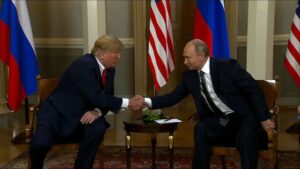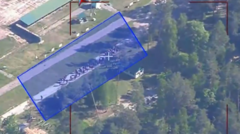In a significant move, Donald Trump has proposed initiating denuclearization talks with Russia and China, indicating a possible pivot in U.S. global nuclear strategy. Speaking at the World Economic Forum in Davos, Trump underscored the financial burdens of nuclear armaments and stressed the necessity for dialogue aimed at arms reduction.
Trump Proposes New Era for Global Denuclearization Talks

Trump Proposes New Era for Global Denuclearization Talks
Former President Donald Trump suggests a potential shift in nuclear policy by advocating for denuclearization discussions with Russia and China.
In his remarks, Trump lamented the "tremendous amounts of money" allocated to nuclear programs, detailing the immense destructive capability they possess—a topic he believes is often overlooked. He urged for strategic discussions between Washington, Moscow, and Beijing to address these concerns and explore potential arms reduction agreements.
This proposal emerges amid strained U.S. relations with both Russia and China. In 2023, Russian President Vladimir Putin announced the suspension of his nation’s involvement in the New START treaty, a pivotal nuclear arms reduction agreement, citing U.S. actions in support of Ukraine. Concurrently, China remains outside formal arms reduction negotiations with the United States, creating hurdles for potential agreements.
Trump's call for renewed nuclear discussions could represent a transformative change in U.S. foreign policy, paving the way for diminished global nuclear stockpiles. However, it provokes critical questions regarding the reliability of Russia and China in adhering to any new agreements.
As this ambitious diplomatic pursuit unfolds, observers will keenly watch whether Washington, Moscow, and Beijing can bridge their differences or if escalating geopolitical tensions will maintain a global nuclear deadlock.
This proposal emerges amid strained U.S. relations with both Russia and China. In 2023, Russian President Vladimir Putin announced the suspension of his nation’s involvement in the New START treaty, a pivotal nuclear arms reduction agreement, citing U.S. actions in support of Ukraine. Concurrently, China remains outside formal arms reduction negotiations with the United States, creating hurdles for potential agreements.
Trump's call for renewed nuclear discussions could represent a transformative change in U.S. foreign policy, paving the way for diminished global nuclear stockpiles. However, it provokes critical questions regarding the reliability of Russia and China in adhering to any new agreements.
As this ambitious diplomatic pursuit unfolds, observers will keenly watch whether Washington, Moscow, and Beijing can bridge their differences or if escalating geopolitical tensions will maintain a global nuclear deadlock.



















